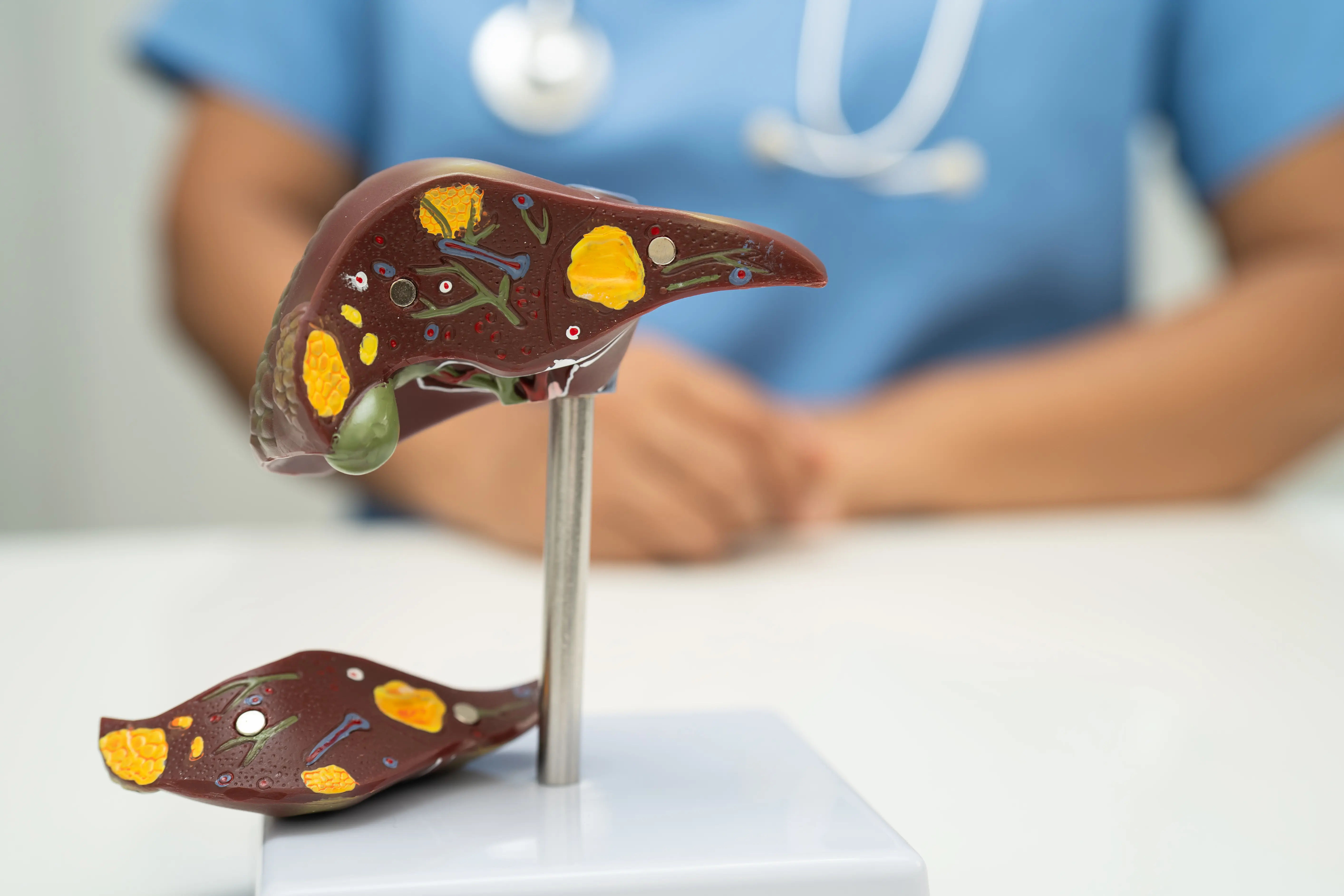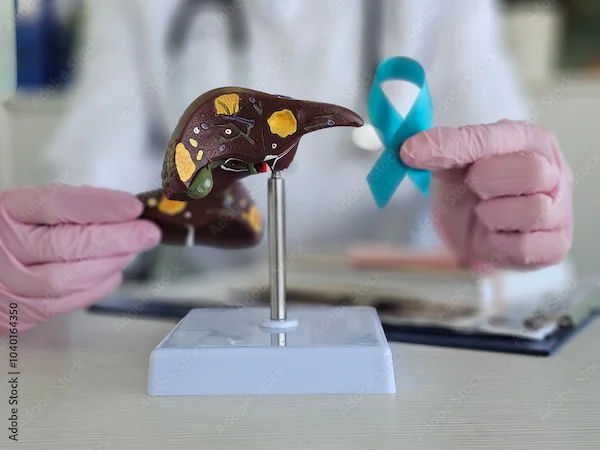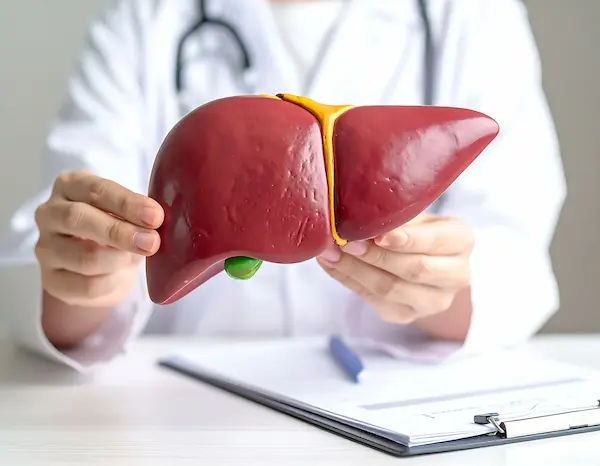How To Reduce Bilirubin Quickly?
Learn how to reduce bilirubin quickly with diet, lifestyle changes, and medical treatments. Discover causes, symptoms, and effective strategies for liver health.

Written by Dr.Sonia Bhatt
Last updated on 3rd Jul, 2025

Bilirubin is a yellowish pigment produced when your body breaks down red blood cells. It is processed by the liver and excreted through bile into the digestive system. Bilirubin plays a key role in your body's waste removal process. It is carried to the liver, where it is converted into a form that can be excreted.
When your levels of bilirubin rise beyond the normal range, you may develop jaundice, a condition that causes yellowing of the skin and eyes.High bilirubin levels can result from liver diseases such as hepatitis and cirrhosis. Gallstones, bile duct obstructions, and haemolytic anaemia can also increase your bilirubin levels.
You should maintain normal bilirubin levels for optimum liver health and overall well-being. If your bilirubin levels become too high, it can indicate liver dysfunction or other underlying health issues.
Symptoms of High Bilirubin
If your bilirubin levels are elevated, your body may show noticeable signs that indicate an underlying issue. Recognising these symptoms early can help you take the necessary steps to manage and reduce bilirubin levels effectively.
1. Recognising Jaundice and Other Signs
One of the most common symptoms of high bilirubin is jaundice, which causes yellowing of the skin and the whites of the eyes. Other signs may include:
Dark-coloured urine
Pale or clay-coloured stools
Fatigue and weakness
Nausea or vomiting
Abdominal pain, especially in the liver area
Loss of appetite
2. When to Seek Medical Attention?
If you experience persistent jaundice, severe fatigue, intense abdominal pain, or unexplained weight loss, you should consult a doctor immediately. High bilirubin levels can indicate serious liver conditions such as hepatitis, liver cirrhosis, or bile duct obstruction. Early medical intervention can prevent complications and support liver function recovery.
Consult Top Gastroenterologist
Diagnosing High Bilirubin Levels
If you suspect high bilirubin levels, medical tests are necessary to confirm the condition and identify potential underlying causes. Early diagnosis helps in managing bilirubin effectively and preventing complications.
1. Common Tests for Bilirubin Assessment
Doctors use blood tests to measure bilirubin levels and assess liver function. The most common tests include:
Total Bilirubin Test – Measures overall bilirubin levels in the blood.
Direct (Conjugated) Bilirubin Test – Assesses bilirubin that has been processed by the liver.
Indirect (Unconjugated) Bilirubin Test – Evaluates bilirubin before it reaches the liver.
Liver Function Tests (LFTs) – Detect abnormalities in liver enzymes and bile function.
2. Interpreting Test Results
Normal total bilirubin levels range between 0.1 and 1.2 mg/dL. If levels exceed this range, it may indicate liver disease, haemolysis, or bile duct obstruction. Elevated direct bilirubin suggests a liver processing issue, while high indirect bilirubin may indicate excessive red blood cell breakdown. A doctor will interpret these results alongside other diagnostic tests to determine the exact cause.
Dietary Approaches to Reduce Bilirubin
Your diet plays a crucial role in supporting liver function and lowering bilirubin levels. Choosing the right foods can help improve bile production, enhance detoxification, and promote overall liver health.
1. Foods to Include in Your Diet
If you have high bilirubin levels, consuming liver-friendly foods can aid in its breakdown and elimination. Include:
Leafy greens (spinach, kale): Support liver detoxification by enhancing bile production and helping flush out toxins.
Citrus fruits (lemon, oranges): Rich in antioxidants that reduce oxidative stress on the liver and aid in bilirubin metabolism.
Beetroot and carrots: Improve bile flow, assisting the liver in breaking down and eliminating bilirubin more efficiently.
Turmeric and ginger: Possess strong anti-inflammatory properties that protect liver cells and enhance overall liver function.
High-fibre foods (whole grains, legumes): Aid digestion by promoting waste removal and reducing the liver’s workload.
Green tea: Supports liver enzyme function by enhancing detoxification and helping break down excess bilirubin.
2. Foods to Avoid
Certain foods can stress your liver and worsen bilirubin levels. You should avoid:
Processed and fried foods that increase liver burden
Alcohol as it impairs liver detoxification
High-fat dairy products that slow bile processing
Excessive sugar and refined carbohydrates that contribute to fat accumulation in the liver
Medical Treatments for Lowering Bilirubin
If your bilirubin levels remain high despite dietary and lifestyle changes, medical treatments may be necessary. Depending on the underlying cause, doctors may recommend medications or specialised therapies to help reduce bilirubin levels effectively.
1. Medications Commonly Used
Certain medications help lower bilirubin by improving liver function or treating the condition responsible for its elevation:
Liver-supporting drugs: Ursodeoxycholic acid (UDCA) improves bile flow and helps eliminate bilirubin.
Antiviral or antibacterial medications: Used when infections such as hepatitis contribute to elevated bilirubin.
Steroids or immunosuppressants: Prescribed for autoimmune conditions affecting the liver.
2. Role of Phototherapy
Phototherapy is commonly used for newborns with neonatal jaundice. The treatment involves exposing the skin to special blue light, which helps break down bilirubin into a form that the body can easily eliminate. While primarily used in infants, phototherapy may also be considered in rare cases of severe bilirubin elevation in adults.
Natural Remedies and Lifestyle Modifications
In addition to medical treatments, natural remedies and lifestyle changes can help lower bilirubin levels and improve liver function. Incorporating herbal supplements, staying hydrated, and maintaining an active lifestyle can support detoxification and overall well-being.
1. Herbal Supplements and Their Efficacy
Certain herbs are known for their liver-protective properties and may aid in reducing bilirubin levels:
Milk thistle: Contains silymarin, which helps protect liver cells and improve bile production.
Dandelion root: Supports liver detoxification and promotes bile flow.
Amla (Indian gooseberry): Rich in vitamin C, it helps reduce oxidative stress on the liver.
2. Importance of Hydration and Regular Exercise
Hydration: Drinking plenty of water supports kidney function and helps flush out excess bilirubin. Herbal teas and coconut water can also aid detoxification.
Exercise: Regular physical activity improves circulation, enhances liver function, and prevents fat accumulation, which can impair bilirubin metabolism. Moderate exercises such as brisk walking, yoga, and stretching can be beneficial in supporting overall liver health.
Complications of High Bilirubin
If high bilirubin levels are not managed properly, they can lead to serious health complications. Prolonged elevation may indicate underlying liver issues and, in severe cases, can cause permanent damage. Infants are particularly vulnerable to complications related to high bilirubin.
1. Potential Liver Damage
Persistently high bilirubin levels may indicate liver dysfunction, leading to conditions such as hepatitis, cirrhosis, or bile duct obstruction. Excess bilirubin can contribute to inflammation and scarring of the liver, affecting its ability to process toxins and nutrients. If untreated, chronic liver disease can develop, increasing the risk of liver failure.
2. Effects on Newborns and Infants
Neonatal jaundice is common in newborns but can become dangerous if bilirubin levels rise excessively. Severe jaundice can lead to kernicterus, a rare but serious condition that causes brain damage due to bilirubin buildup in the brain. Early detection and treatment, such as phototherapy, are essential to prevent long-term neurological complications in infants.
Preventative Measures
Preventing high bilirubin levels involves regular health monitoring and adopting lifestyle habits that support liver function. Taking proactive steps can help maintain healthy bilirubin levels and reduce the risk of liver-related complications.
1. Regular Health Screenings
Routine medical check-ups help detect early signs of liver dysfunction. Liver function tests (LFTs) and bilirubin tests should be conducted periodically, especially if you have a history of liver disease or conditions like hepatitis. If you experience persistent jaundice, fatigue, or digestive issues, consulting a doctor for further evaluation can help prevent complications.
2. Maintaining a Healthy Liver
A strong liver ensures proper bilirubin metabolism. Avoid excessive alcohol consumption, as it damages liver cells and impairs detoxification. Follow a balanced diet rich in antioxidants, fibre, and healthy fats. Staying hydrated, engaging in regular exercise, and managing stress also contribute to overall liver health. Avoiding unnecessary medications and toxins further protects liver function, ensuring optimal bilirubin processing.
Conclusion
If you need to lower bilirubin quickly, staying hydrated, consuming liver-friendly foods, and avoiding processed foods can help improve liver function. Medical interventions such as medications or phototherapy may be necessary in severe cases. Herbal supplements like milk thistle and dandelion root can also support detoxification.
To maintain healthy bilirubin levels, regular health screenings, a balanced diet, and an active lifestyle are essential. Avoiding alcohol, processed foods, and unnecessary medications helps protect liver function. By prioritising liver health through proper hydration, exercise, and stress management, you can prevent bilirubin imbalances and support long-term well-being.
Consult Top Gastroenterologist
Consult Top Gastroenterologist

Dr. Amit Pandita
Gastroenterology/gi Medicine Specialist
10 Years • MBBS. MD (INTERNAL MEDICINE) DrNB (GASTROENTEROLOGY AND HEPATOLOGY)
Delhi
Apollo Hospitals Indraprastha, Delhi

Dr. Sunil Kaul
General Surgeon
30 Years • MBBS, MS, FICS, FIMSA, FMAS
Delhi
Apollo Hospitals Indraprastha, Delhi
(25+ Patients)

Dr Piyush Vishwakarma
Gastroenterology/gi Medicine Specialist
11 Years • MBBS, MD, DrNB,
Delhi
Apollo Hospitals Indraprastha, Delhi

Dr. Ankit Vijay Agarwal
Gastroenterology/gi Medicine Specialist
14 Years • MBBS(Osmania), DNB(Internal Medicine ), DM ( Osmania) Consultant Gastroenterologist, Hepatologist and Advanced Therapeutic Endoscopist
Hyderabad
Apollo Hospitals Jubilee Hills, Hyderabad

Dr Harish K C
Gastroenterology/gi Medicine Specialist
15 Years • MBBS MD DM MRCP(UK) (SCE-Gastroenterology and Hepatology)
Bengaluru
Apollo Clinic, JP nagar, Bengaluru
Consult Top Gastroenterologist

Dr. Amit Pandita
Gastroenterology/gi Medicine Specialist
10 Years • MBBS. MD (INTERNAL MEDICINE) DrNB (GASTROENTEROLOGY AND HEPATOLOGY)
Delhi
Apollo Hospitals Indraprastha, Delhi

Dr. Sunil Kaul
General Surgeon
30 Years • MBBS, MS, FICS, FIMSA, FMAS
Delhi
Apollo Hospitals Indraprastha, Delhi
(25+ Patients)

Dr Piyush Vishwakarma
Gastroenterology/gi Medicine Specialist
11 Years • MBBS, MD, DrNB,
Delhi
Apollo Hospitals Indraprastha, Delhi

Dr. Ankit Vijay Agarwal
Gastroenterology/gi Medicine Specialist
14 Years • MBBS(Osmania), DNB(Internal Medicine ), DM ( Osmania) Consultant Gastroenterologist, Hepatologist and Advanced Therapeutic Endoscopist
Hyderabad
Apollo Hospitals Jubilee Hills, Hyderabad

Dr Harish K C
Gastroenterology/gi Medicine Specialist
15 Years • MBBS MD DM MRCP(UK) (SCE-Gastroenterology and Hepatology)
Bengaluru
Apollo Clinic, JP nagar, Bengaluru



